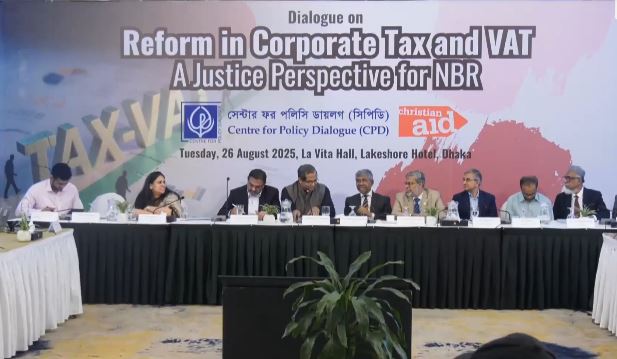News Flash

DHAKA, Aug 26, 2025 (BSS) - Centre for policy dialogue (CPD) today urged the National Board of Revenue (NBR) to establish an expert committee comprising tax professionals, chartered accountants, and business representatives to regularly review and update the list of allowable deductions, expenditure caps, and definitions related totaxable income.
The private think tank mentioned that firms usually report their accounting profit in financial statements and taxes are assessed based on taxable profit, which is calculated differently.
CPD observed that due to the presence of advanced tax, minimum tax, incentives, exemptions, and deductions, differences in accounting and taxable profit, a firm's effective tax rate can differ from the stipulated corporate tax rate.
The think tank made the observation at a dialogue titled "Reform in Corporate Tax and VAT: A Justice Perspective for NBR" at a hotel in the city.
NBR Chairman Md Abdur Rahman Khan FCMA attended the workshop as the chief guest while Chair of the NBR Reform Advisory Committee Dr Muhammad Abdul Mazid and NBR Member (VAT Audit) (Current charge) Syed Mushfequr Rahman attended as special guests.
Member of the NBR Reform Advisory Committee Farid Uddin, President of the Bangladesh Knitwear Manufacturers and Exporters Association (BKMEA) Mohammad Hatem and Joint Secretary of the Finance Division under Ministry of Finance Md. Abul Basher were guests of honour while Chartered Accountant Mohammad Zahid Hossain FCA, President of the Dhaka Taxes Bar Association A. H. M. Mahbubus Salekin and NBR First Secretary (VAT Supervision and Taxpayers Services) Md Moshiur Rahman were discussants at the event.
CPD Research Director Dr Khondaker Golam Moazzem delivered the welcome speech while Country Director of the Christian Aid Bangladesh Nuzhat Jabin delivered the introductory remarks.
CPD Senior Research Associate Tamim Ahmed delivered the keynote speech.
Abdur Rahman Khan said the NBR has introduced the automated system allowing VAT-registered manufacturing companies to file their VAT returns directly from their own ERP software with a single click, through integration with the iVAS (Integrated VAT Administration System).
"Previously, manufacturing firms could not submit VAT returns directly from their ERP (Enterprise Resource Planning, which many offices use) systems. They had to prepare returns in their own software and then manually input all the data again into the iVAS platform, which was time-consuming and reduced system efficiency," he said.
In his presentation, Tamim Ahmed said the corporate income tax (CIT) structure should be reformed to ensure that the statutory tax rate for both export oriented and non-export sectors is not lower than 15 percent, aligning with the global minimum tax commitment under the OECD/G20 Inclusive Framework while still preserving Bangladesh's competitive advantage.
The current flat reduced corporate tax rate for all listed companies should be reformed with performance-based or conditional incentives, such as tax benefits linked to capital investment, export growth, or employment generation, he added.
He said globally practiced alternatives such as tax credits for IPO-related costs, temporary tax holidays for newly listed firms, or reduced audit scrutiny, can offer more targeted and equitable support.
Tamim Ahmed, however, said NBR should also form a dedicated oversight committee, including representatives from the business community, chartered accountants, and NBR officials, to review and resolve disputes related to disallowed businessexpenditures in a transparent and consistent manner.
The government should target raising corporate profits as a share of GDP from the current 6 percent to 15 percent by 2030 by enabling a more ease business environment, he added.
In parallel, he said, the effective corporate tax rate should be gradually reduced from the existing 31-33 percent to around 23 percent.
He said NBR should aim to increase the current corporate tax base to at least 59% of registered companies.
"In this regard, Office of the Registrar of Joint Stock Companies and Firm should start reviewing and eliminating inactive businesses from the registry, ensuring that the data for registered companies is up to date," he added.
To encourage greater tax compliance, he said, NBR and Registrar of Joint Stock Companies and Firm should make the tax submission status related data of all the registered entities publicly accessible through a dedicated database.
To encourage tax compliance, he said, repeated failure to submit tax returns for multiple years should be made a criminal offense by law.
He said the Ministry of Education should introduce mandatory dedicated classes in schools, colleges, and universities to educate students about the process of tax return submission.
"NBR should make it mandatory for all businesses to submit tax returns digitally, eliminating manual submission. Additionally, there should be tax-paying services at local Upazila Digital Centres (UDCs) to ensure that small and local businesses can easily access the tools and resources needed to file their returns electronically," he opined.
He noted that the NBR should consolidate the current eight VAT slabs into a simplified three-tier structure (e.g., Standard, Reduced, and Zero rates), with the long-term goal of transitioning toward a two-tier system (Standard and Zero Rates).
Regarding VAT, Tamim Ahmed said, NBR should remove problematic exemptions for non-essential services provided by entities such as exclusive clubs and stock market agencies to broaden the tax base and improve horizontal equity.
"By applying VAT to all commercial and non-sovereign activities of the President's Office, setting a higher standard of fairness for all public institutions, NBR should intensify the use of mobile courts in sectors prone to cash-based transactions and evasion, using data analytics to target operations for maximum impact on revenue recovery," he added.